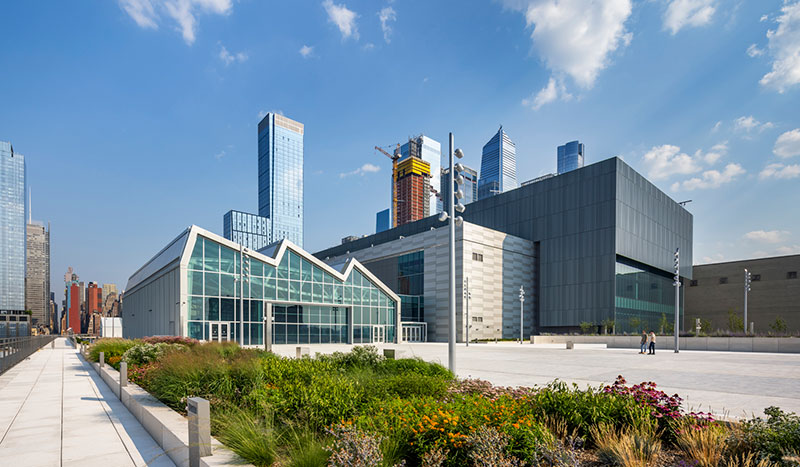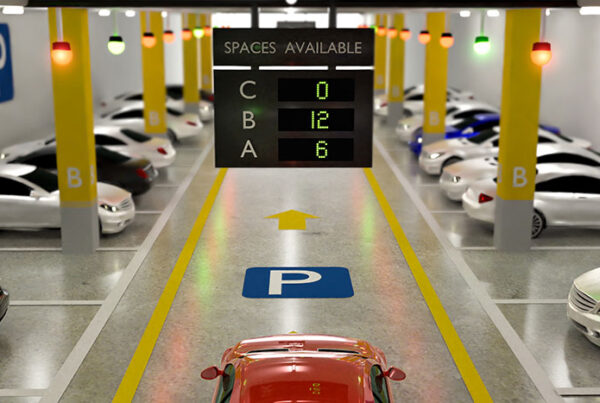
The Javits Center’s new rooftop event space as part of its $1.5 billion expansion project on Manhattan’s West Side.
The New York Convention Center Operating Corporation announced the completion of the Javits Center’s new rooftop event space as part of its $1.5 billion expansion project on Manhattan’s West Side. The 200,000-square-foot (18580 sq m) rooftop includes a glass-enclosed pavilion, outdoor terrace, and one-acre working farm, which is expected to generate up to 40,000 pounds (18,143 kg) of produce each year. The farm, along with several other sustainable upgrades, builds on the success of the convention center’s robust sustainability program.
Led by the New York Convention Center Development Corporation, a subsidiary of Empire State Development, the state’s chief economic development agency, a Lendlease and Turner joint venture and architectural firms TVS, Moody Nolan, Stantec and WXY Studio, the four-year expansion project was completed on budget despite the challenges related to COVID-19.
“The Javits Center has set a new standard in sustainability that aligns with Lendlease’s global commitment to addressing climate change … targeting absolute zero carbon by 2040,” said Steven Sommer, executive general manager and president of New York Construction at Lendlease. “As an iconic New York structure, the expanded Javits Center will inspire all who visit to make their own contributions at both the corporate and individual levels as we work together to realize a greener, more sustainable future for our planet.”
“The Javits Center has played a critical role in New York’s fight against COVID-19, and with this new expansion, it will continue to serve as one of the Empire State’s greatest economic assets,” said Kevin Younis, chief operating officer and executive deputy commissioner of Empire State Development. “With the construction of a one-of-a-kind rooftop pavilion, along with a one-acre rooftop farm, the Javits Center will continue to attract dynamic events that support New York’s economy while serving as a model of sustainability for other venues and buildings throughout the country.”

The expanded Javits Center features new meeting room and prefunction space, including a special event space—the largest of its kind in the Northeast.
The expanded Javits Center features new meeting room and prefunction space, including a 54,000-square-foot (5,017 sq m) special event space—the largest of its kind in the Northeast. The new exhibition and meeting spaces are equipped with the latest technology in lighting fixtures, heating and cooling systems, and wireless connectivity. The newly expanded Javits Center features 500,000 contiguous square feet of event space, which will help attract international business conferences, as well as a four-level truck marshaling facility that can house up to 200 tractor-trailers at one time. Construction of all of these spaces, which was considered a part of the original design, was completed in May 2021. As a part of the project, 75 percent or more of all construction waste was diverted from landfills for reuse, and all construction materials were chosen with sustainable characteristics including high recycled content and local sourcing.
Highlights of the rooftop expansion include:
- The Farm. A one-acre rooftop farm that will provide fresh produce for on-site consumption, with recycled rainwater used for irrigation; includes a greenhouse that can host intimate gatherings such as board meetings or meals for up to 25 people. Brooklyn Grange, a Brooklyn-based urban farming company, will manage the day-to-day operations of the farm and the greenhouse and work closely with members of the facility’s new dining and hospitality team, Cultivated, to direct crops to on-site kitchens, where the produce will be incorporated into meals served to clients.
- The Pavilion. A 15,000-square-foot (1,390 sq m), glass-enclosed space that can host events with up to 1,500 individuals throughout the year; adjacent to a massive outdoor terrace, along with a meadow, a shade garden and an orchard with 32 apple trees and six pear trees.
- Solar Farm. More than 3,000 solar panels to be installed on the existing and expansion rooftops, making it the largest rooftop solar farm in Manhattan. It is expected to generate 1.7 megawatts of solar energy with an additional 3.5 megawatts of battery storage, providing the convention center with more than 2 gigawatt hours per year.
- Water Conservation. The installation of two underground retention cisterns helps capture and treat rainwater to be used for irrigation on the roof, reducing the need for potable water for irrigation by at least 50 precent.

